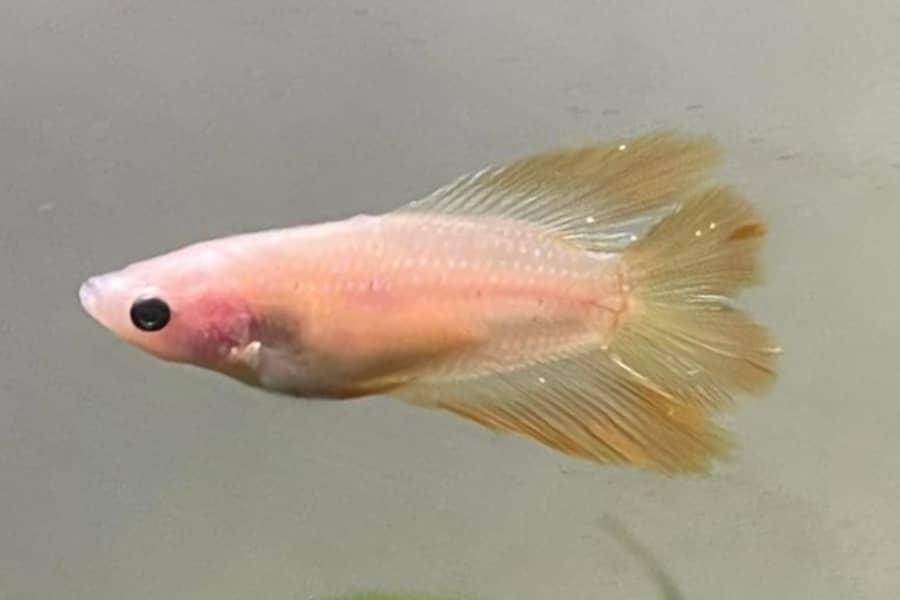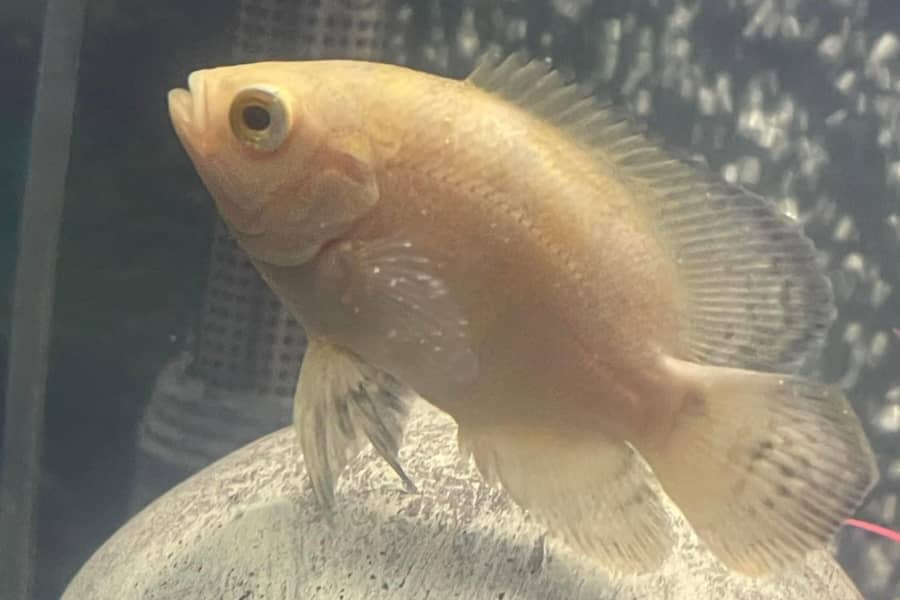This post may contain affiliate links.
And one fine morning you wake up from a good night’s sleep, only to find out that your fish has contracted the Ich infection. The tiny white specks have covered your aquatic pet from its gills to the fins. What do you do now?
Fortunately, Ich is one of the easiest diseases to treat. “So, what’s the most effective way to treat the infestation and beat it away from the aquarium? you may ask.” The following sections should sufficiently answer all the questions you may have about Ich.
Ich Infestation – Everything You Should Know About White Spot Disease

A Betta Fish Infected By Ich
Ich (also written as ick) is the most common parasitic disease that affects both freshwater and saltwater fish.
In all truth, an outbreak of Ich is a true emergency situation. Being highly contagious, the white spot disease spreads rapidly from one fish to another and is capable of causing massive mortality within a short period.
As the infection approaches later stages, it becomes more deadly and harder to cure thus reducing your fish’s chances of full recovery. Early diagnosis followed by prompt treatment is crucial for controlling the disease and avoiding fish loss.
Common Signs of Ich
The presence of the tiny white spots on the fish’s skin (resembling the grains of salt or sugar) is a clear indication of the Ich infestation.
In some cases, the white patches may appear on the gills, while in others, they can be seen all over the fish’s body, gills, and fins.
Other typical symptoms that an Ich-infected fish may exhibit include flashing or scratching against tank items, rapid or labored breathing, hiding behavior, lethargy, or loss of appetite.
What Causes Ich In Fish?
In most cases, it’s the failure to quarantine a new fish that causes Ich. Any new fish you bring home from a pet store can be a potential carrier of Ich; even if it doesn’t show any symptoms in the beginning.
The Ich parasite can also be transmitted to aquariums from contaminated water, equipment, plants, filter media, and decor items.
Some people in the fish-keeping community even believe that Ich is ever present in the tanks holding fish. But there is no scientific evidence for this claim!
How to Treat Ich or White Spot Disease?

API Super Ick Cure and Hikari Ich-X are the most popular and effective Ich medications available on the market, suitable for both freshwater and marine aquariums.
Just get either one and start dosing your tank according to the instructions mentioned on the medication. But firstly remove the carbon or charcoal filter from your tank.
While you are treating your aquarium, change one-third of the water every day and do substrate siphoning. As replacing water dilutes the medication, make sure to sufficiently dose your tank to make up for the loss.
Besides using commercial medications, there is a commonly known heat and salt method for curing Ich. This is a natural remedy that works but it’s slower than chemical treatments and is not suitable for heat-sensitive fish species and planted aquariums.
What’s The Safest Treatment For Curing Ich on Scaleless Fish?
Both Hikari Ich-X and API Super Ick Cure are considered safe for scaleless fish. However, considering these fish’s sensitivity towards copper-based medication, it’s recommended to use half of the regular dose.

Hikari Ich-X
In case, you don’t want to expose your scaleless fish to chemicals, go for heat therapy. It involves increasing the temperature and doing daily water changes.
80°F – 86°F is the commonly suggested temperature for Ich-infested cases. But not all fish can tolerate such a high temperature, so depending on your fish species, crank up as much as suitable. And do it gradually, over the days, to avoid stressing the fish.
NOTE: Raising the tank’s temperature results in the depletion of dissolved oxygen, so to compensate for that, you will need to increase the water aeration using a powerhead or airstone.
Can Garlic Cure White Spot Disease In Fish?
If you go around finding the Ich cure on the internet, you may come across fishkeeping forums suggesting garlic as an all-natural, home remedy for the infection. But does it even work?
The truth is: garlic has no direct effect on Ich. All it does is, strengthen the fish’s immunity system, which in turn may help the aquatic creature to fight off Ich.
So even though garlic doesn’t treat Ich, it’s a natural immune booster with antibiotic properties that will certainly be helpful for sick fish.
Most Effective Practices To Keep Ich At Bay

The only way to prevent Ich is to quarantine all new arrivals before introducing them to the main tank. This period can last anywhere between 2 to 4 weeks.
Besides quarantining, you need to ensure a stress-free environment that includes a constant temperature, optimal water quality, a lightly stocked tank, and a well-balanced diet.
Frequently Asked Questions
Can fish survive Ich?
An Ich infection is not deadly enough to immediately kill a fish (unless its immune system is severely compromised.) However, if left untreated, the infection will lead to advanced stages, resulting in the demise of your beloved aquatic pet.
Can Ich transfer to humans?
Ich has no ill effect on humans. You will not be infected if you touch the contaminated water or equipment. However, you should always wash your hands thoroughly with warm water and properly sanitize them to ensure you don’t transmit the parasite to your other aquariums.
What to do if Ich medications have no improvement in your fish’s condition?
Currently, there are a plethora of Ich medications available; some work, some don’t. We can’t take a guarantee for anything except the ones we have mentioned in this article, namely Hikari Ich-X and API Super Cure. If you are using one of these, and they don’t seem to work, it means you may have misdiagnosed the ailment. You must reevaluate.
Conclusion
Treating Ich in fish is fairly straightforward but takes time. So be patient and trust the process. If you do exactly what we have suggested, it would be unreasonable for you to not get your fish recovered from the white spot disease.
